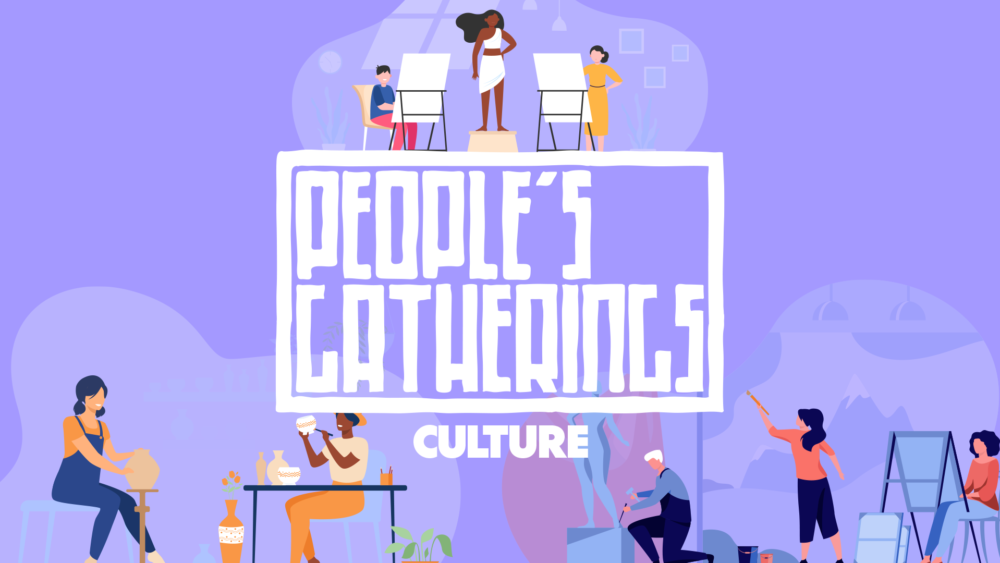People’s Gatherings x DiEM Voice: Cultural Policies in Portugal took place on Thursday, April 15. We’d like to tell you how this Gathering went and highlight its most positive aspects as an example for future People’s Gatherings.
First of all, we kept to schedule! Not only did the Gathering start on time, but it also ended after 1h05 minutes. This is key, especially nowadays when we are all overwhelmed with online meetings that take up too much time.
There were eight attendees, of which three were members of DiEM25 and five were external. All were involved in cultural and artistic fields.

David Marques, a well-known dancer and choreographer, was invited to participate in the Gathering and acted as the ‘expert’. He with us the current state of affairs surrounding labour rights for cultural workers and artists in Portugal.
He participated in the Gathering as the representative of Ação Cooperativista, an informal cultural group that has united many workers, artists and organisations around one goal to defend cultural workers and artists’ labour rights and propose political reform to improve their situation. Ação Cooperativista was formed last year, when the pandemic turned the lives of those who work in the cultural sector totally unsustainable.
Since then, the organisation was recognised by the Portuguese Government, together with other organisations, including Plateia and CENASTE, as a meaningful player to be consulted before taking major decisions.
In this Gathering, we tried to answer one question that came from the current Portuguese political agenda. The Ministry of Culture is developing a statute for artists supposedly to protect them from precarious working and living conditions.
So the question we tackled was: is this new statute protecting artists enough?
David Marques immediately made clear that it wasn’t — due to the fact that the statute doesn’t recognise that most artists and cultural workers do not have steady employment. In this sense, the social measures advanced in the statute are set to exclude most artists and cultural workers. To benefit from it you need to:
- have paid social contributions for 12 months (unemployment subsidy) or
- have paid social contributions for 6 months and then be inactive for 3
months (activity suspension subsidy)
It was very clear to all attendees that the statute that the Government is trying to put in place is a fallacy. It should instead strive to implement a system close to the French one named ‘les intermittents du spectacle’, where artists and cultural workers have access to social benefits when inactive.
Ana Pereira pointed to the lack of recognition of cultural and art work in Portugal, not only coming from society at large but also from workers of the sector themselves. Indeed, Portuguese cultural workers and artists are used to devaluing their work thereby creating a vicious circle of low wages in the sector.
David Marques listed three top priorities to fight for in Portugal:
- A price table, containing minimum prices for each service
- A real ‘intermittent’ statute for artists and cultural workers
- A bigger yearly public budget for Culture
Catarina Santos suggested that cultural and arts’ workers should unite with other workers who also experience precarious working conditions, such as University teachers in Portugal, to make both of their demands stronger.
Mónica Jardim reminded participants that the cultural sector in Portugal represents 3% of the Portuguese GDP. Yet, we are still fighting for the Government to give 1% of its yearly budget to the sector. She wondered what the Municipalities are doing to support the sector locally in the context of the pandemic.
David Marques told participants Ação Cooperativista is participating in the European Commission’s project, Voices of Culture. He criticised it since it assumes artists’ mobility is already achieved in all corners of Europe. In reality, Portuguese artists move away from Portugal, not to have access to mobility programmes, but because they have no choice.
Nadia Sales Grade then asked how participatory this project was. David recognised that this may be one more of those projects which makes citizens believe they are being part of a participatory decision-making process, when in fact it is only a process with no consequences at all.
Nadia also asked David what the role of DiEM25 could be in defending the labour rights of artists labour across Europe. He suggested that DiEM25 could gather information on legislation in different countries, so that these new cultural and political movements could have more information on the different models that exist across Europe.
In conclusion:
- We discussed one main question: does this new statute sufficiently protect artists? The group came to the conclusion that it does not.
- We explored potential future policy paths: a price list, containing minimum prices for each service, a real “intermittent” status for artists and cultural workers, a larger annual public budget for culture and more support from Municipalities.
- We identified ways to empower activism in the fields of culture and the arts by joining forces with other precarious sectors.
- We identified the role that DiEM25 can play in supporting activist organizations at the local level through gathering information about the various statutes that exist in this sector in various European countries.
If you want to organise your own People’s Gathering, register here.
Do you want to be informed of DiEM25's actions? Sign up here















